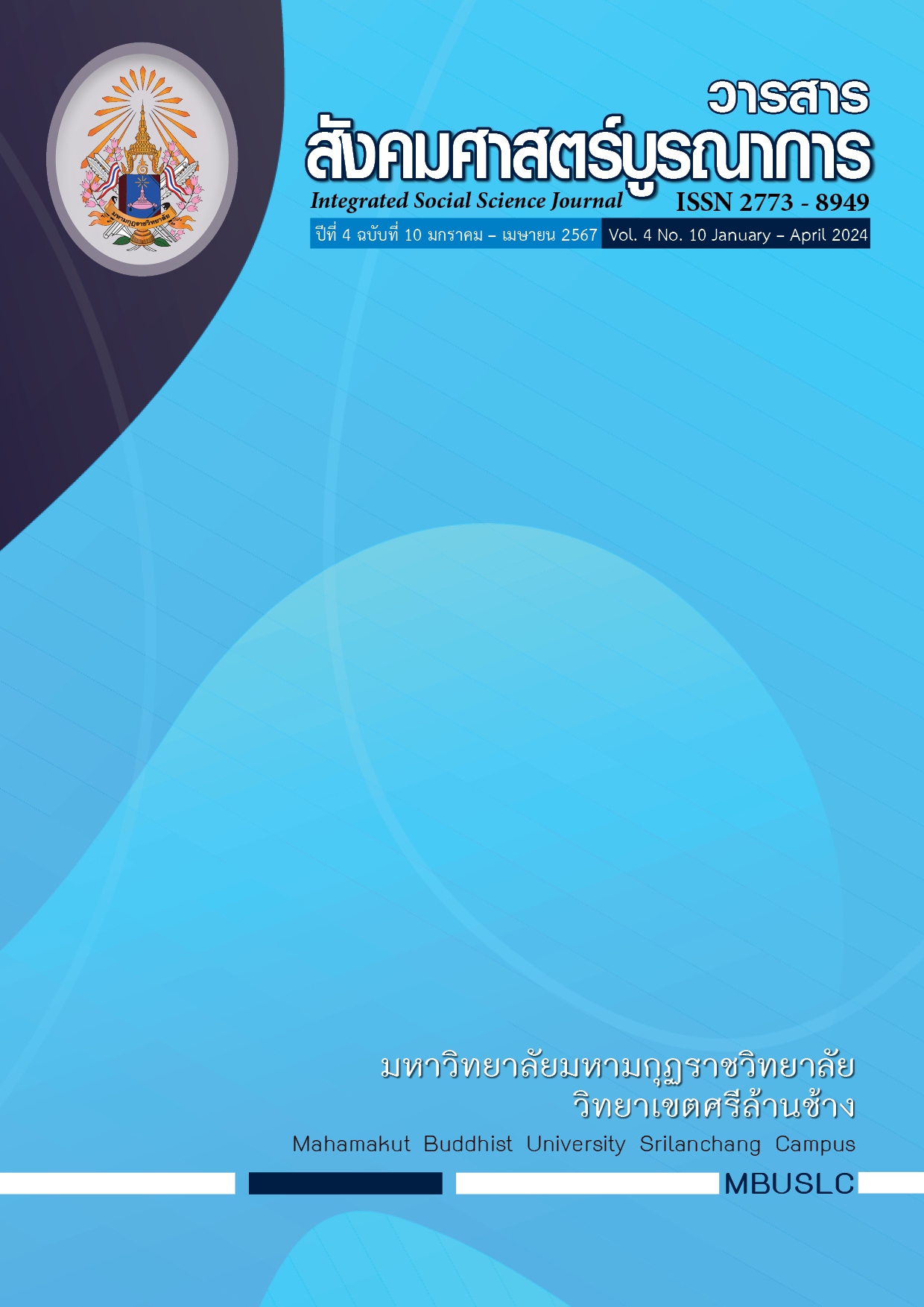BUDDHISM AND MENTAL DEVELOPMENT
Main Article Content
Abstract
Apart from the social situation at present, there was a rapid change upon the influence of surroundings, and it made human beings get such mental troubles as stress, anxiety, alienation, solitariness, emptiness, oppression, etc. All mental troubles were totally called as suffering (Dukkha) in Buddhism. The development of human minds with Buddhist teachings was very important because it was worthy and it was able to make common persons the noble ones in the society. The development of human minds with Buddhist teachings was referred to what was called Buddhist psychology, the concept based upon the Buddha’s teachings such as the Four Noble Truths (Ariyasacca), the Dependent Origination (Paṭiccasamuppāda), and the Three Characteristics (Tilakkhaṇa). In addition, other Buddhist teachings were implemented in development of human minds as follows: 1) The principle of meditation (Kammaṭṭhāna) consisted of tranquility development (Samatha-kammaṭṭhāna), which was aimed to have the developer attain concentration or absorption of mind, and insight development (Vipassanā-kammaṭṭhāna), which was targeted to have the developer realize the reality of things without any doubt, and any attachment of defilement and suffering. 2) The contemplation of mind (Cittānupassanā), which was mindfulness as regards thoughts. It was claimed to give rise to wisdom and it was beneficial for self-awareness and self-development on conscience and thoughtfulness. 3) The four foundations of mindfulness (Satipaṭṭhāna) were referred to purification of human minds through unflagging endeavour, by which human wisdom was developed. The principle of development (Bhāvanā) comprised of physical development (Kāyabhāvanā), moral development (Sīlabhāvanā), mental development (Cittabhāvanā), and intellectual development (Paññābhāvanā).In fact, all the Buddhist teachings taken for development of human minds were proclaimed to lead the people to the reality of everything, to drive the people to hold their life in accordance with reality, to relieve suffering in human life and to lift up quality of human minds.
Article Details

This work is licensed under a Creative Commons Attribution-NonCommercial-NoDerivatives 4.0 International License.
บทความที่ได้รับการพิจารณาจากคณะกรรมการผู้ทรงคุณวุฒิและเผยแผ่ในวารสารฉบับนี้ เป็นทัศนคติและข้อคิดเห็นส่วนบุคคลของผู้เขียนแต่ละท่าน ไม่ถือว่าเป็นทัศนะคติและความรับผิดชอบ
ของบรรณาธิการ
บทความ ข้อมูล เนื้อหา รูปภาพ ฯลฯ ที่ได้รับการตีพิมพ์ในวารสารสังคมศาสตร์บูรณาการ ถือเป็นลิขสิทธิ์ของวารสารสังคมศาสตร์บูรณาการ หากบุคคลหรือหน่วยงานใดต้องการนำทั้งหมดหรือส่วนหนึ่งส่วนใดไปเผยแพร่ต่อหรือเพื่อกระทำการใด ๆ จะต้องได้รับอนุญาตเป็นลายลักอักษรจากวารสารสังคมศาสตร์บูรณาการ ก่อนเท่านั้น
References
กัลยา รักหลวง และคณะ. (2551). มนุษย์กับการดำเนินชีวิต. อยุธยา: เทียนวัฒนาพริ้นติ้ง.
เจษฎา มูลยาพอ และคณะ. (2561). การพัฒนาสุขภาพจิตของผู้สูงอายุตามแนวพระพุทธศาสนาในจังหวัดหนองคาย. สืบค้น 27 มีนาคม 2564. จาก http://198.7.63.81:8080/xmlui/bitstream/handle/123456789/515
a. /2561-025ผศ.ดร.เจษฎา%20มูลยาพอ.pdf?sequence=1&isAllowed=y
ชมพูนุท ศรีจันทร์นิล. (2552). จิตวิทยาแนวพุทธ: แนวทางเพื่อการเยียวยา และพัฒนาจิตใจมนุษย์. วารสารวิชาการ มหาวิทยาลัยหอการค้าไทย ปีที่ 29 ฉบับที่ 4. 188 – 208.
ณัฐรินทร์ นิธีกีรติชานนท์. (2556). พระพุทธศาสนากับชีวิตวัยรุ่นไทยในโลกสมัยใหม่. Journal of Nakhonratchasima College. ปีที่ 7 ฉบับที่ 2. 106 – 113.
ประกาศิต ประกอบผล. (2560). การพัฒนาคุณภาพจิตตามแนววิปัสสนากรรมฐาน. วารสารวไลยอลงกรณ์ปริทัศน์ มนุษยศาสตร์และสังคมศาสตร์. ปีที่ 7 ฉบับที่ 3. 85 - 100.
ปัณณวิชญ์ พิบูลธนาภิรมย. (2561). อำนาจจิตกับความสำเร็จในชีวิต : พระพุทธศาสนากับจิตวิทยาสมัยใหม่. วารสารศิลปศาสตร์ปริทัศน์. ปีที่ 13 ฉบับที่ 26. 79 – 89.
พระครูใบฎีกาหัสดี กิตฺตินนฺโท. (2560). การพัฒนาจิตตามแนวพระพุทธศาสนา. สารนิพนธ์พุทธศาสตรบัณฑิต ประจำปี 2560. 208 - 220.
พระครูสุตาภรณ์พิสุทธิ์ และคณะ. (2561). การพัฒนาตนตามหลักพระพุทธศาสนา. วารสาร มจร พุทธปัญญาปริทรรศน์. ปีที่ 3 ฉบับที่ 2. 1 – 18.
พระพรหมคุณาภรณ์ (ป.อ.ปยุตฺโต). (2551). พจนานุกรมพุทธศาสตร์ ฉบับประมวลธรรม. พิมพ์ครั้งที่ 17. กรุงเทพฯ: โรงพิมพ์มหาจุฬาลงกรณราชวิทยาลัย.
พระมหาผล นาควโร. (2563). การพัฒนาจิตตามแนววิปัสสนากรรมฐานในสังคมยุค 4.0. วารสารวิชาการ มจร บุรีรัมย์. ปีที่ 5 ฉบับที่ 2. 162 – 175.
พนัทเทพ ณ นคร และพระมหาโสภณ วิจิตฺตธมฺโม. (2561). พุทธจิตวิทยากับการพัฒนาตนเองให้มีความเจริญงอกงาม. วารสารพุทธจิตวิทยา. ปีที่ 2 ฉบับที่ 1. 31 - 45.
พระครูปลัดเถรานุวัตร (สุเทพ สุเทวฺเมธี). (2561). พระสงฆ์กับการมีส่วนร่วมในการพัฒนาคุณภาพชีวิตของประชาชน. วารสารวิชาการ บัณฑิตวิทยาลัยสวนดุสิต. ปีที่ 14 ฉบับที่ 3. 127 – 142.
สุทธญาณ์ โอบอ้อม และคณะ. (2563). การเสริมสร้างจิตพฤติกรรมการเป็นพลเมืองที่ดีในสังคมประชาธิปไตยของนักเรียนในจังหวัดนครปฐม. วารสารวิทยาลัยสงฆ์นครลำปาง. ปีที่ 9 ฉบับที่ 2. 65 – 77.

